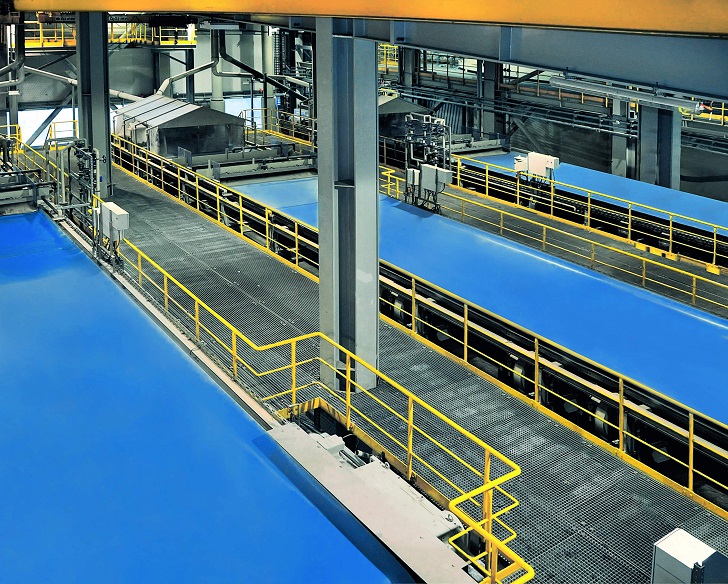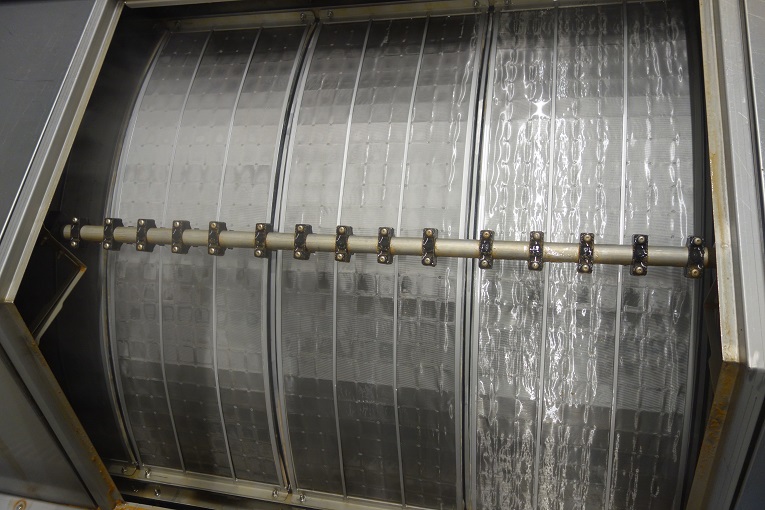

The GKD Group has always invested in global work distribution. Yet strong growth and the expanding complexity of processes revealed some limitations. To increase support processes across the group, structured systems were created connecting sites and promoting global knowledge sharing.
What has long been standard for global companies, such as central digital platforms for recording, controlling, and analysing all company activities, is often still the exception in small and medium-sized businesses (SMEs). GKD began by homogenising the data environment in its production. Machine connection and the introduction of a manufacturing execution system (MES) in 2015 for controlling production in the main factory in Düren, marked the beginning of its digital transformation in manufacturing, making the family-run company a pioneer among SMEs.
Nevertheless, its recent strong growth took the GKD Group to its limits. Information and knowledge were exchanged only at management and executive board level, if at all. For geographical reasons alone, cross-location co-operation between teams could not be implemented efficiently. In order to eliminate these obstacles to growth and get the most out of existing synergies, what needed to be done was to digitalise all business processes within the Group.
The stated aims of this transformation are stronger co-operation and to ensure Group-wide knowledge transfer. Under the leadership of Lara Kufferath, who is responsible for corporate development and so digitalisation, the company has been driving forward its new strategy since the start of 2019.
Process analysis The first step was an intensive process analysis lasting around five months. At all locations, the business processes, systems, and functions used were analysed, structured, and redesigned to set the course for the desired multiplier effect. With this as the basis, a digital strategy encompassing all locations was developed to support the corporate strategy. The GKD Group’s previous strategy of numerous satellites on fine threads was to be transformed into a firmly networked entity. “We need systems in order to achieve more with less effort,” says Lara Kufferath, explaining the fundamental premise on which the entire digital transformation in the company is based.
Customer focus The primary focus was on the core process of order acquisition and market development, supported by a group-wide customer relationship management (CRM) system. All customer data and customer-related activities are now centrally recorded and available in this system. Comprehensive and structured overviews, functionalities, and evaluations support all sales’ processes across all sites. The 360-degree view of customers’ needs that this creates also makes it possible to identify new business areas and respond proactively to altered requirements with corresponding product innovations.
Accompanying marketing campaigns allow specific target groups to be approached personally, and services and touch points can be geared to specific customers. As such, GKD customers worldwide immediately benefit from a significantly greater depth of consultation and even faster solutions to problems. “With the CRM system, we have redefined cooperation in the GKD Group, with the result that everything works faster, more effectively, and more efficiently,” says Dr Stephan Kufferath, commercial director.
Worldwide interactive cooperation Parallel to this, GKD internally rolled out the Infobase, which is a global knowledge database that unites three elements. As an intranet, it pursues the goal of bringing employees together and strengthening the team culture. Open exchange and arranging to meet for lunch or leisure activities, such as the weekly running meet, are just as likely to be found here as employee interviews or introductions by new co-workers. At the touch of a button, all 900 employees can also view important information that was previously only posted on local information boards. The database is also a collaboration platform for meetings and workflows.
For the first time, it allows communication and co-operation within project teams that goes far beyond any previously known scope. This modern form of interactive co-operation, also with service providers and suppliers, increases speed as well as transparency. Highly complex projects can be realised together in a far better and simpler way. Examples include processes such as the introduction of the CRM system or the International Automotive Task Force (IATF) certification that is currently underway.
Collective intelligence This increase in efficiency is supported by the third function of Infobase which brings together the collective intelligence of the company. Knowledge and information that was previously only available locally or in the heads of employees is recorded and made available centrally. Whether it’s product, market, or application knowledge, internal processes or the right specialist contact person, a quick search will find staff what they need instantly.
Any open questions are asked in Infobase and answered promptly by co-workers in the know. This transparency lowers inhibitions surrounding asking questions, increases the knowledge of the individual, and strengthens team spirit. For customers, this even better command of processes means higher quality and consulting competence throughout the group as well as lower costs.
Generating ideas & development Within GKD, these advantages quickly became apparent in day-to-day activity, helping to generate a high level of acceptance for the systems among employees. They contributed to its development with a wealth of ideas. Even the company suggestion scheme received a huge boost through the increased visibility of the individual and a previously unmatched level of active feedback from co-workers. All of which contributed to GKD’s knowledge bank.
This is all to the great satisfaction of Lara Kufferath: “Now that we have brought the knowledge present within the GKD group together in a solid data platform and are continuing to push forward with this, we can make use of many synergies at operational level. Here we have created the requirements for further growing the company while having also increased employee motivation and customer satisfaction.”






